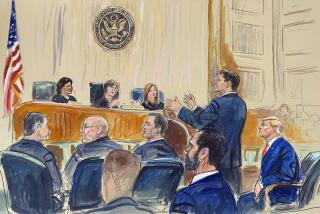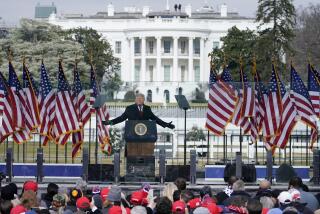Is the Bush administration criminally liable for its lawlessness?
Whatever its other legacies, the Bush administration will be remembered for its contemptible disregard for the law in the post-9/11 war on terrorism. From the wiretapping of Americans without a court order to the waterboarding of suspected terrorists to the refusal to abide by the requirements of the Geneva Convention, many of the administration’s policies can fairly be described as lawless.
But were they also criminal? Should officials, including Vice President Dick Cheney and former Defense Secretary Donald H. Rumsfeld, be put on trial, either in a court of law or in a forum like South Africa’s Truth and Reconciliation Commission? As the Bush administration nears its end, calls for such a reckoning are coming from civil libertarians and some supporters of President-elect Barack Obama. Some even argue that President Bush should be indicted.
This editorial page has been uncompromising in its criticism of the Bush administration’s flouting of international and domestic law. The administration was wrong to evade courts in seeking warrantless surveillance of Americans, wrong to establish the Guantanamo Bay detention center, heinous in its acceptance of torture. But we are wary of either the criminal prosecution of administration officials or some South-Africa-style process.
The former model is reminiscent of the Watergate scandal, in which several officials -- including President Nixon -- broke identifiable criminal statutes by obstructing the investigation of a burglary motivated by partisan politics. From there, of course, Watergate expanded into a web of criminal violations, from break-ins to the use of the IRS to punish political enemies of the Nixon White House. It’s conceivable that individuals in the Bush administration violated criminal law. But if they did so as part of a post- 9/11 response to terrorism, it would be all but impossible to prosecute them successfully.
Besides, the scandal of the Bush administration wasn’t a matter of individual, politically motivated violations of law. Rather, it was a systemic failure to take seriously the spirit as well as the letter of this country’s commitment to the humane treatment of prisoners or the privacy rights of Americans secured by the Foreign Intelligence Surveillance Act, or FISA.
That’s a failure in which Congress must share culpability with the administration. It was the administration that, with the help of compliant legal counsel, rationalized the use of “enhanced” interrogation techniques such as waterboarding, sleep deprivation, humiliation and the use of dogs to intimidate prisoners of war and suspected terrorists. But, as the vice president argued recently, Congress at first either acquiesced in, or offered muted objections to, the administration’s policies. That the failures were collective rather than individual makes them no less appalling, but it does suggest that a criminal prosecution will not remedy them.
Likewise, it was the administration that arrogated to itself the power to create a bargain-basement judicial system to try detainees at Guantanamo Bay, Cuba, a policy that fortunately was nullified by the U.S. Supreme Court. But it was Congress, once it took responsibility for establishing procedures for military commissions, that voted to strip from detainees the right to challenge their confinement by seeking the ancient writ of habeas corpus. Here too it was left to the Supreme Court to uphold timeless principles of justice.
These lapses, however, tell only part of the story. This country’s system of checks and balances -- which we would define broadly to include a free press -- responded, albeit belatedly, to some of the administration’s excesses. This is why the analogy to the apartheid regime in South Africa is fatally flawed.
In enacting anti-torture provisions in the 2005 Detainee Treatment Act, Congress seemed to have ended waterboarding, though it wrongly perpetuated a double standard under which the CIA could use harsher interrogation methods than the armed services. After the New York Times exposed the National Security Agency’s secret surveillance program, Congress passed a new version of FISA that, while imperfect, reined in spying on Americans and increased judicial oversight. Those actions may not have gone far enough, but they suggest a system of accountability, however imperfect.
Even within the Bush administration, political appointees such as former Atty. Gen. John Ashcroft and FBI Director Robert S. Mueller III pushed back against the administration’s most blatant attempts to circumvent the law. Support for the rule of law also came from courageous Justice Department lawyers such as Jack Goldsmith, who rescinded a torture-friendly legal opinion supplied by a predecessor.
The Bush administration’s lawlessness calls for a serious reckoning, one that already has begun with a scathing report by the Senate Armed Services Committee about the role played by Rumsfeld and other officials in the spread of abusive interrogation techniques. That’s welcome and appropriate -- and a vindication of American institutions designed to investigate the misconduct of public officials. Further congressional investigation of the administration’s spying program is also in order. But as enticing as many find the idea of putting Rumsfeld or Cheney in the dock, neither a show trial nor a truth commission would be the right way to expunge or atone for the abuses of this administration. Thankfully, those who sanctioned them will soon be history.
More to Read
A cure for the common opinion
Get thought-provoking perspectives with our weekly newsletter.
You may occasionally receive promotional content from the Los Angeles Times.






